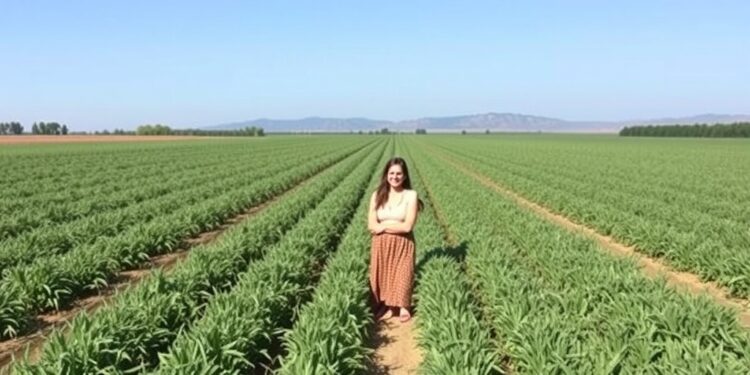The integration of various plant species within a farming ecosystem, commonly referred to as intercropping, presents numerous agronomic advantages. This practice is characterized by the cultivation of different but complementary plants in close proximity, allowing for better exploitation of resources and enhanced ecological balances. Recent studies emphasize that intercropping can lead to significant benefits such as reduced soil erosion, effective weed suppression, increased nitrogen fixation, and positive impacts on pollinator populations. When combined with the right climatic conditions, this dynamic cultivation strategy can lead to substantial benefits in terms of land use efficiency and overall productivity.
A noteworthy research focus is on the alfalfa-almond intercropping system under a Mediterranean climate. This region presents unique challenges and opportunities for agricultural practices, primarily due to its distinct weather patterns and soil types. The study, which has garnered attention within the agricultural science community, examines how intercropping can enhance environmental sustainability while simultaneously offering financial returns for farmers. With almond trees often requiring specific care and resources during their dormant season, the inclusion of alfalfa during winter months serves multiple functions, from conserving moisture to enriching the soil.
Investigations revealed that intercropping alfalfa with almond trees during the winter season effectively reduces field water loss through evaporation. This is particularly crucial within Mediterranean climates, where water resource management is of paramount importance. The ability to minimize evaporation not only conserves vital moisture within the soil but also influences the overall health of the almond trees, promoting more resilient and productive orchards. Moreover, the intercropping system enhances nitrogen retention in the soil, addressing one of the critical concerns for crop management in orchards.
In this innovative agroecosystem, the alfalfa serves as a green cover crop, which not only retains soil moisture but also acts as a barrier against winter soil nitrate leaching. Researchers noted a remarkable decrease in nitrate leaching in comparison to control plots lacking intercropping, providing empirical evidence of the benefits of this sustainable practice. Such findings indicate that farmers can not only mitigate nitrogen losses but can also transform these into financial gains, especially during otherwise non-productive winter seasons.
The corresponding author of this research, Touyee Thao, PhD, emphasized the importance of resource use efficiency in agricultural practices. By cultivating alfalfa in alignment with almond trees, farmers achieve improved utilization of both water and nutrients, which translates to reduced operational costs and enhanced productivity. The comparative effectiveness of intercropping shows that not only are the immediate benefits considerable, but the long-term environmental impacts contribute to a more sustainable agricultural framework.
The implications of this research extend beyond mere productivity, delving into ecological health. The incorporation of diverse plant species fosters beneficial interactions among plants, microbes, and the broader soil ecosystem. Researchers continue to study the interactions between tree growth and productivity, as well as the influence of soil microbial activity, to gain further insights into how these ecological synergies can be optimized within agricultural systems.
Additionally, as the global agricultural landscape contends with the increasing pressures of climate change, understanding the efficacy of intercropping practices is crucial. The Mediterranean region, characterized by its unique climatic challenges, provides an ideal setting to explore these sustainable practices. The study aims to bridge the gap between agricultural productivity and environmental stewardship, advocating for systems that harmonize economic viability with ecological necessity.
The potential for intercropping as a strategy within sustainable agriculture continues to grow. Farmers are increasingly recognizing that diversifying their crop systems not only contributes to healthier soil and plants but also provides resilience against pests, diseases, and climatic variability. Alfalfa’s role in nitrogen fixation serves to enhance soil fertility, which is critical for the longevity of any farming operation, especially those relying on perennial crops like almonds.
In tandem with environmental benefits, the financial advantages of intercropping cannot be overlooked. By utilizing every season productively, including the winter months traditionally seen as fallow periods, farmers can diversify their income streams. This financial capital can subsequently be reinvested into farm management practices, leading to an overall improvement in farm sustainability.
Moreover, farmers practicing intercropping may earn recognition for their commitment to sustainable practices, which can attract consumers seeking eco-friendly products. The rising demand for sustainably produced foods presents an economic incentive for farmers to adopt practices that align with both ecological and economic sustainability.
The comprehensive insights drawn from the alfalfa–almond intercropping study offer a promising vision for the future of agriculture. As researchers continue to explore these integrative agricultural systems, they reinforce the notion that successful farming is not merely about high yields, but about fostering ecosystems that thrive on diversity and resilience.
In conclusion, the pioneering exploration of intercropping alfalfa with almonds provides compelling evidence of how multidisciplinary approaches can yield ecological and economic benefits. As agricultural practices evolve, the role of innovative systems such as intercropping will become increasingly integral to ensuring food security and environmental health.
Subject of Research: Intercropping Alfalfa with Almonds
Article Title: Intercropping Alfalfa During Almond Orchard Establishment Reduces Winter Soil Nitrogen and Water Losses, Provides On-farm Revenue
News Publication Date: 8-Jan-2025
Web References: Agrosystems, Geosciences & Environment
References: DOI: 10.1002/agg2.70024
Image Credits: Not Provided
Keywords: Intercropping, Alfalfa, Almond, Winter Soil Nitrogen, Mediterranean Climate, Sustainable Agriculture, Soil Conservation, Crop Diversity, Environmental Benefits, Nitrogen Fixation, Water Management, Pollinator Support.




